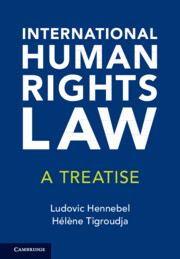Book contents
- International Human Rights Law
- International Human Rights Law
- Copyright page
- Dedication
- Contents
- About the Authors
- Acknowledgments
- Note on the Text
- Table of Cases
- Abbreviations
- Part I Foundations of International Human Rights Law
- Title 1 Theoretical Elements of International Human Rights Law
- Title 2 Normative Pluralism in International Human Rights Law
- Title 3 The Relationship Between International Human Rights Law and Other Branches of International Law
- Part II The Machinery of International Human Rights Law
- Part III The Interpretation of International Human Rights Law
- Part IV Remedies and Implementation of International Human Rights Decisions
Title 1 - Theoretical Elements of International Human Rights Law
from Part I - Foundations of International Human Rights Law
Published online by Cambridge University Press: 10 April 2025
- International Human Rights Law
- International Human Rights Law
- Copyright page
- Dedication
- Contents
- About the Authors
- Acknowledgments
- Note on the Text
- Table of Cases
- Abbreviations
- Part I Foundations of International Human Rights Law
- Title 1 Theoretical Elements of International Human Rights Law
- Title 2 Normative Pluralism in International Human Rights Law
- Title 3 The Relationship Between International Human Rights Law and Other Branches of International Law
- Part II The Machinery of International Human Rights Law
- Part III The Interpretation of International Human Rights Law
- Part IV Remedies and Implementation of International Human Rights Decisions
Summary
This title explores the foundational theoretical aspects of international human rights law, delving into the philosophical underpinnings and conceptual frameworks that shape our understanding of human rights. It examines the historical evolution of human rights ideas, the influence of various philosophical traditions, and the ongoing debates about the nature and universality of human rights. This section also addresses the epistemological ruptures between philosophy and law, and between law and justice, highlighting the challenges in reconciling these perspectives within a coherent human rights framework. It discusses the contributions of different schools of thought, such as natural law, positivism, and sociological approaches, to the development of human rights theory. By critically analyzing these theoretical foundations, this title aims to provide a deeper understanding of the principles and values that underpin international human rights law and to highlight the complexities and nuances involved in defining and protecting human rights in diverse cultural and legal contexts.
Keywords
- Type
- Chapter
- Information
- International Human Rights LawA Treatise, pp. 3 - 40Publisher: Cambridge University PressPrint publication year: 2025

